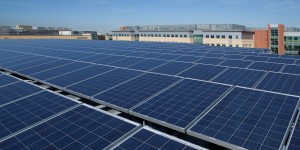
Environmental health and the health of individuals and communities are strongly connected. As a health care provider, Kaiser Permanente feels a special responsibility to address the impacts of climate change on health and to reduce pollutants that can lead to disease. It’s all part of how we look at the total health of people and communities, considering all of the factors that influence their health outside of the doctor’s office.
That definition for total health became richer with the recent announcement that Kaiser Permanente was joining the august ranks of Apple, Google, and other large, environmentally-conscious companies that choose to be leaders in the green energy arena.
 Kaiser Permanente announced last month that we completed several agreements to purchase enough renewable energy to reduce our greenhouse gas emissions by 30 percent nationwide by the beginning of 2017. These agreements mean that about 50 percent of the electricity used at our facilities in California will come from renewable energy sources.
Kaiser Permanente announced last month that we completed several agreements to purchase enough renewable energy to reduce our greenhouse gas emissions by 30 percent nationwide by the beginning of 2017. These agreements mean that about 50 percent of the electricity used at our facilities in California will come from renewable energy sources.
The health care sector is poised, perhaps better than most, to plug in to the conversation about the health impacts of climate change and help direct the next stages of climate action. The health care industry carries a considerable environmental footprint, and Kaiser Permanente is partnering with Health Care Without Harm and the Business Renewables Center, launched recently by nonprofit Rocky Mountain Institute, to help not only the health care industry, but the entire U.S. business sector, move toward more abundant clean energy solutions.
“Climate change isn’t a distant threat,” said Kathy Gerwig, Kaiser Permanente’s environmental stewardship
officer. “The health impacts of a changing climate can be felt today in the form of increasing rates of asthma and other respiratory ailments, spread of infectious diseases, heat stress, and injuries from severe weather events. By addressing climate change for the future, we are improving the health of communities today.”
Purchasing renewable energy supports KP’s core mission of total health, and it also makes good business sense.
“We expect this energy purchase to be cost neutral over the term of the contracts,” said Ramé Hemstreet, Kaiser Permanente’s chief energy officer. “By locking in rates, we can better forecast energy costs, and by using diverse fuel sources, we can protect our business from escalating and volatile energy prices. That’s great news for our members.”
So, the next time you see or visit a Kaiser Permanente facility, rest assured that green energy is making a major contribution to powering our facilities, addressing climate change and improving the total health of our members and communities.
More details of this announcement are captured in the infographic, video, and press release on Kaiser Permanente’s Share website.
